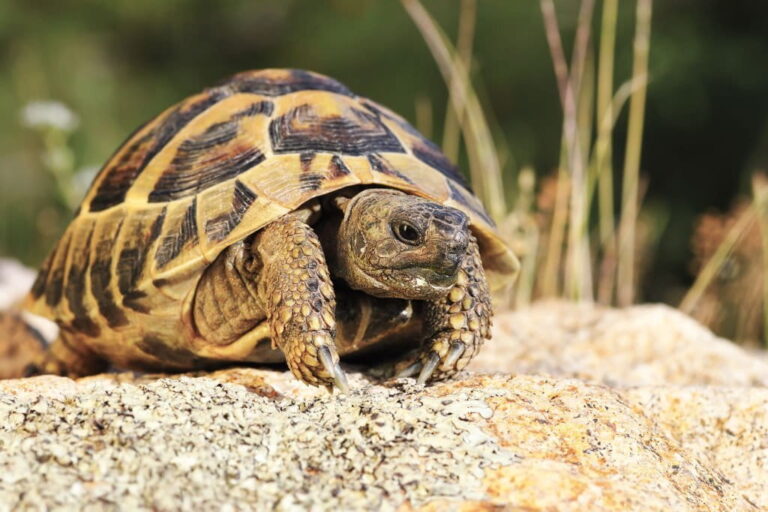Yes, tortoises make sounds. The most frequent turtle noise heard by humans is hissing. The majority of turtle noises are too low-pitched for humans to hear. Some turtle noises are audible, but they are too faint and brief for us to detect. Turtles make noises by exhaling air at different intensities and speeds from their lungs. Many audible turtle noises are caused by a respiratory illness. Make an appointment with your reptile doctor if you see your pet turtle making more noises than normal.
Which Sound Can Tortoises Make ?
Turtles emit a wide variety of noises, which may surprise you. Some of them are plainly audible. The hiss of an enraged turtle is a sound that most people will never forget. Other turtle noises are beyond the range of human hearing. Some turtle noises are audible to children but not to adults.
1. Hissing
When turtles hiss, they do it by forcing air out of their lungs. When they retreat their body inside their shell, they tend to hiss.
In a turtle’s shell, there isn’t much additional space! For the entire body to fit, the lungs must collapse. The air is then evacuated, resulting in a hissing sound. Consider air escaping from a punctured tire.
The sound of a giant tortoise breathing might sometimes be mistaken for a hiss. When turtles struggle to breathe due to a respiratory ailment, they may emit a hissing noise.
2. Grunting
The sound of grunting is comparable to that of hissing. The same physical response of air departing the lungs generally causes it.
Hisses are deeper and longer than grunts. They’re most likely the outcome of letting more air out at once.
3. Crying
A respiratory ailment is the most common reason of a turtle sobbing. Excess mucus in the airways narrows the passageways for airflow. Consider how different airflow sounds when you whistle.
The screams of a turtle can also sound like little meows.
4. Roaring
When agitated, big-headed turtles (Platysternon megacephalum) are known to make a roaring sound. This is most certainly a hiss in another form. Their unusual structure may contribute to their loudness.
5. Chirping
A chirping or squeaking sound is made by some tortoises. This is most likely owing to a stress-induced increase in respiratory rate. Baby tortoises make this noise more frequently, according to tortoise caretakers.
6. Singing
In 2005, naturalist Lang Elliott managed to catch a recording that supposedly features an adult male snapping turtle (Chelydra serpentina) vocalizing.
7. Echolocation
The Arrau river turtle, commonly known as the huge South American river turtle (Podocnemis expansa), will be shown regularly. When it comes to vocalizations, they are the most sociable and well-studied freshwater turtle species.
Arrau river turtles have a three-and-a-half-foot carapace and can weigh up to 200 pounds. They’re found in the Amazon, Orinoco, and Essequibo basins of South America. Nesting, migrating, and basking in groups are some of their distinctive social characteristics.
Arrau river turtles, according to scientists, use a special sort of echolocation to navigate the muddy riverbeds. Turtle vocalizations have just lately been studied by biologists. Only time will tell what these enigmatic beings are capable of.
Why Do Tortoises Croak?

Dogs bark for a variety of causes. Language is used to discuss a wide range of subjects. Turtle sounds, meanwhile, serve a variety of reasons. If you have any worries about the noises, send your tortoise to a trustworthy veterinarian for the best care and treatment. A squeaking sound from your tortoise should not cause you to become concerned or worried. Let’s take a look at the six most typical reasons for a squeaky turtle.
1. Nares or Nose Squeaks
Debris in the nares is one cause of squeaking or quacking noises in tortoises (nose). When the tortoise inhales or exhales, a piece of dry substrate detritus inhaled might make odd noises. The sound is sometimes characterized as a whistle or a squeak. The sound is caused by a limitation in airflow via the nares, and it should go away after 24 hours. If not, you might wish to consult a veterinarian.
Some tortoise owners have even reported that this is a regular sound for their turtle. They explain that the tortoise’s nares are smaller than average, resulting in a whistling or squeaky sound when they inhale quickly.
We recommend taking your tortoise to the doctor if he or she is making any unusual noises.
2. Respiratory Illness Squeaks
Tortoises with squeaks or wheezing may have a respiratory illness (RI). You should check whether any of the following symptoms are present in addition to the squeaking, wheezing, or quacking noises.
- The Tortoise has stopped eating and has become quite sedentary.
- Beyond bath time, there is a discharge or bubble at the nares.
- The tortoise is stretching its neck more than normal to take a breath.
- The tortoise’s mouth is gaping open as it breathes.
- When the tortoise breathes, it makes a wheezing sound.
Make an appointment with your veterinarian if you believe your tortoise has a respiratory ailment. When RI is detected early, it is simple to cure. That’s why we always advise, “if in doubt, contact the vet.”
Don’t be alarmed; your vet will inject an antibiotic into the tortoise’s soft limb or shoulder to help clean up the illness.
If any of the aforementioned symptoms are present together with the squeak, schedule an appointment with your tortoise’s veterinarian as soon as possible.
3. Overgrown Beak Squeak
Squeaking and quaking noises in tortoises can be caused by an oversized beak, believe it or not. It’s more likely to sound like a click. When a tortoise’s beak becomes too long, it rubs against the bottom of the tortoise’s mouth. The squeak or click sound might be caused by friction.
If the beak begins to touch or extend past the chin, it should be trimmed. This is something that your veterinarian can perform quickly and simply.
Make an appointment with your veterinarian to get your tortoises’ beaks clipped. Keep an avian cuttlefish bone in the cage as a deterrent. To aid in the natural wear of the beak, feed your tortoise on a flat rock or clay pot dish.
4. Startle Response Squeak
Does your tortoise make a noise when you inadvertently scare it? Almost every tortoise owner has heard this sound while reaching into the enclosure to catch their turtle.
This is usually a hissing sound, but depending on the breed, it can also sound like a squeak.
Tortoises respond to being shocked by quickly retracting their legs and heads within their shell for safety. The tortoise is forced to exhale in order to bring in its appendages as a result of this reaction. The squeaky noise is caused by quick exhalation.
Solution: Get accustomed to it; it’s a natural tortoise startle reaction. Make sure your tortoise sees you arriving and keep unexpected movements to a minimum until they’ve gotten acclimated to your routine.
5. Mating Squeaks
Is your turtle a fully grown male? His squeak might be due to his effort to mate. Squeaking noises are made by male tortoises as part of their mating ritual. Even if you just have a single male tortoise or all males, they can try to mate with each other and inanimate objects at the correct time of year. Isn’t it strange?!?! However, this is correct.
This is, once again, a normal reaction. Make a habit of chuckling.
6. Environmental Issues
Tortoises may be found in a number of habitats. It’s critical to understand the ideal environmental conditions for your unique breed’s health.
In a dry climate, certain tortoises will emit a whistling or squeaking sound. The nares of a tortoise can grow dry if they don’t get enough moisture, causing them to squeak or whistle as they breathe.
Solution: Keep your breed’s humidity at a comfortable level. As needed, moisten the Substrate. Russian tortoises, for example, like 40-50 percent humidity, but Sulcata tortoises want 80 percent. Understand your breed.
Temperatures that are too low or just after a bath might also create a squeaky tortoise. It’s critical to maintain your tortoises at a comfortable temperature.
Conclusion
Tortoises do make many noises. A squeak or quacking sound is not unusual and does not necessarily mean there is impending doom for your tortoise.

